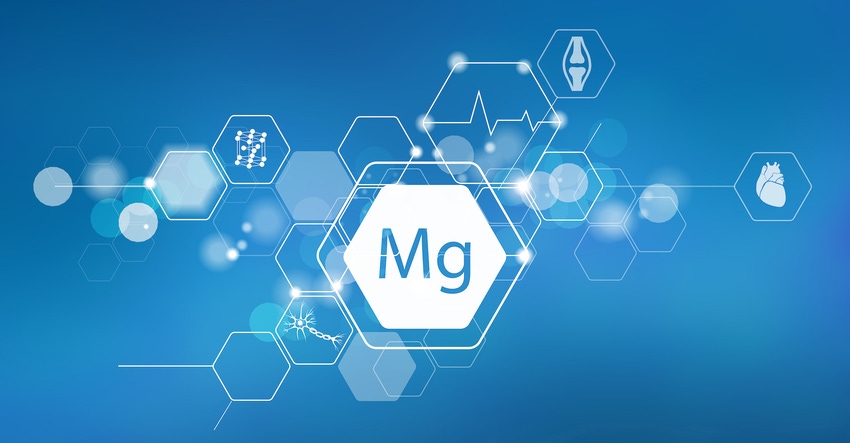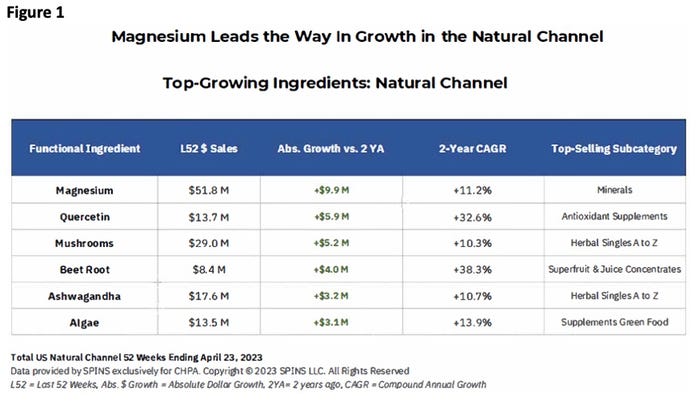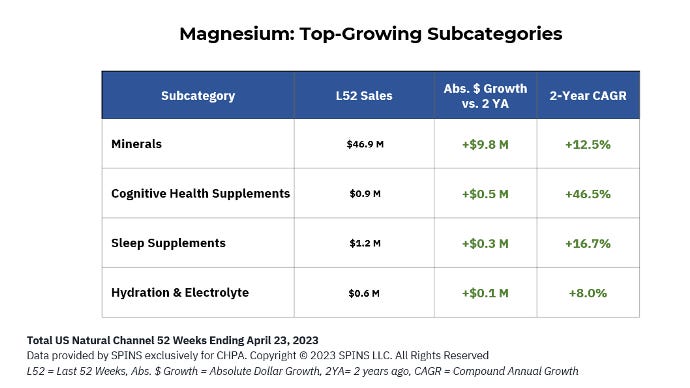The Senior Vice President of Dietary Supplements at the Consumer Healthcare Products Association details the latest developments in the science and marketing of magnesium.

At a Glance
- Magnesium is a top-selling mineral ingredient.
- Sales growth is fueled by new indications.
- Those benefits include heart health, energy and mood support.
In the evolving landscape of nutrition and dietary supplements, trends surge in and out of popularity, influenced by a mix of science and shifting consumer interests. However, one standout at this year’s Natural Products Expo East was the reemergence of magnesium as a superstar ingredient.
What sets this resurgence apart is that magnesium is not a fleeting “fad” sparked by the latest social media craze. Instead, it's a comeback ingredient driven by a growing body of scientific research highlighting the importance of the essential mineral. In fact, well before 2023’s Natural Products Expo East, magnesium had claimed a position as the top-selling functional ingredient (in terms of dollar sales), according to data from the Consumer Healthcare Products Association (CHPA) and SPINS, a wellness-focused data technology company (Figure 1).

A timeless mineral meets modern science
Magnesium is not a newcomer to the dietary supplement scene. It has been appreciated for its role in muscle function, bone health and nerve function. However, recent years have seen increased interest in magnesium, fueled by modern scientific research that has expanded the understanding of its potential role in categories like heart health, energy production and mood regulation.
From magnesium-infused beverages to advanced magnesium supplements such as magnesium glycinate effervescent powders, the diversity of offerings reflects the growth in market innovation. In addition, the CHPA/SPINS data from April 2023 shows increased consumer use of magnesium as a key functional ingredient across multiple categories, including cognitive health, sleep and hydration (Figure 2).

Scientific validation
Scientific studies continue to amass compelling support of magnesium's positive impact on various aspects of wellness, spanning cardiovascular health to mood regulation. This scientific validation has ignited interest among researchers, health care professionals and consumers.
Magnesium’s rise
So, what factors have propelled magnesium from relative obscurity to a standout ingredient in the dietary supplement market?
U.S. Food and Drug Administration (FDA) recognition
In 2022, FDA acknowledged the benefits of magnesium on blood pressure. This recognition followed extensive research submitted by the Centers for Magnesium Education and Research. While FDA permits a qualified health claim stating that "adequate magnesium may reduce the risk of high blood pressure (hypertension)," it also requires a qualifying statement acknowledging the inconsistent and inconclusive nature of the evidence.
Athlete-fueled demand
Magnesium's significance in muscle function and energy production has made it a sought-after supplement in the world of sports nutrition. Athletes have incorporated magnesium into their regimens in the hopes of enhancing exercise recovery, reducing muscle cramps, and optimizing their overall performance.
Holistic health approach
Magnesium's multifaceted role in the body aligns perfectly with the growing interest in holistic health. It is viewed as an ingredient that addresses multiple facets of wellness, from heart health to stress management. Much like omega-3 fatty acids, magnesium is now a key functional ingredient across diverse categories, including cognitive health, sleep and hydration.
A mineral with multifaceted benefits
Magnesium is a versatile mineral that is part of over 300 biochemical reactions within the human body. Serving as a cofactor for enzymes involved in processes such as energy production, muscle and nerve function, and DNA synthesis, magnesium plays an indispensable role in overall well-being.
The recommended daily intake of magnesium varies by age, gender and life stage. In general, adult men should aim for around 400-420 milligrams per day, while adult women should target 310-320 milligrams. Pregnant and lactating women may require slightly more. Although the importance of obtaining magnesium through dietary sources cannot be overstated, studies have consistently indicated that many Americans fall short of their daily magnesium requirements. The National Health and Nutrition Examination Survey (NHANES) reported that a sizable portion of the population consumes less than the recommended amount of magnesium solely through their diet.
Magnesium supplements
When consumers fall short of meeting their magnesium needs from dietary sources alone, supplements can be a valuable addition to a daily routine. Manufacturers are marketing various types of magnesium supplements with unique characteristics. Some common options include magnesium citrate, magnesium oxide, magnesium glycinate, magnesium L-threonate, magnesium malate and magnesium sulfate.
Embracing science and advocacy
The journey of magnesium—once an overlooked mineral—to its status as a top functional ingredient is a testament to the importance of science to drive nutrition policy. For example, as the Dietary Guidelines for Americans (DGAs) continue to emphasize the value of obtaining magnesium through dietary sources, increased recognition emerges that dietary supplements play a crucial role for those with dietary restrictions, deficiencies or specific health goals.
FDA's qualified health claim for magnesium's potential blood pressure benefits is another example of the evolution of nutrition policy and regulation, paralleling the recognition granted to omega-3 fatty acids.
In a world where ingredient trends come and go, the resurgence of magnesium stands as a remarkable journey guided by science and fueled by advocacy efforts. The Centers for Magnesium Education and Research is one such organization that promotes knowledge of nutritional magnesium and the peer-reviewed science that supports it. Magnesium is experiencing notable momentum, as indicated by robust sales and its prominent presence at 2023’s Natural Products Expo East. This not only aligns with consumer preferences but also underscores the potential for significant public health benefits by addressing the essential nutrient gap.
About the Author(s)
You May Also Like






.png?width=800&auto=webp&quality=80&disable=upscale)